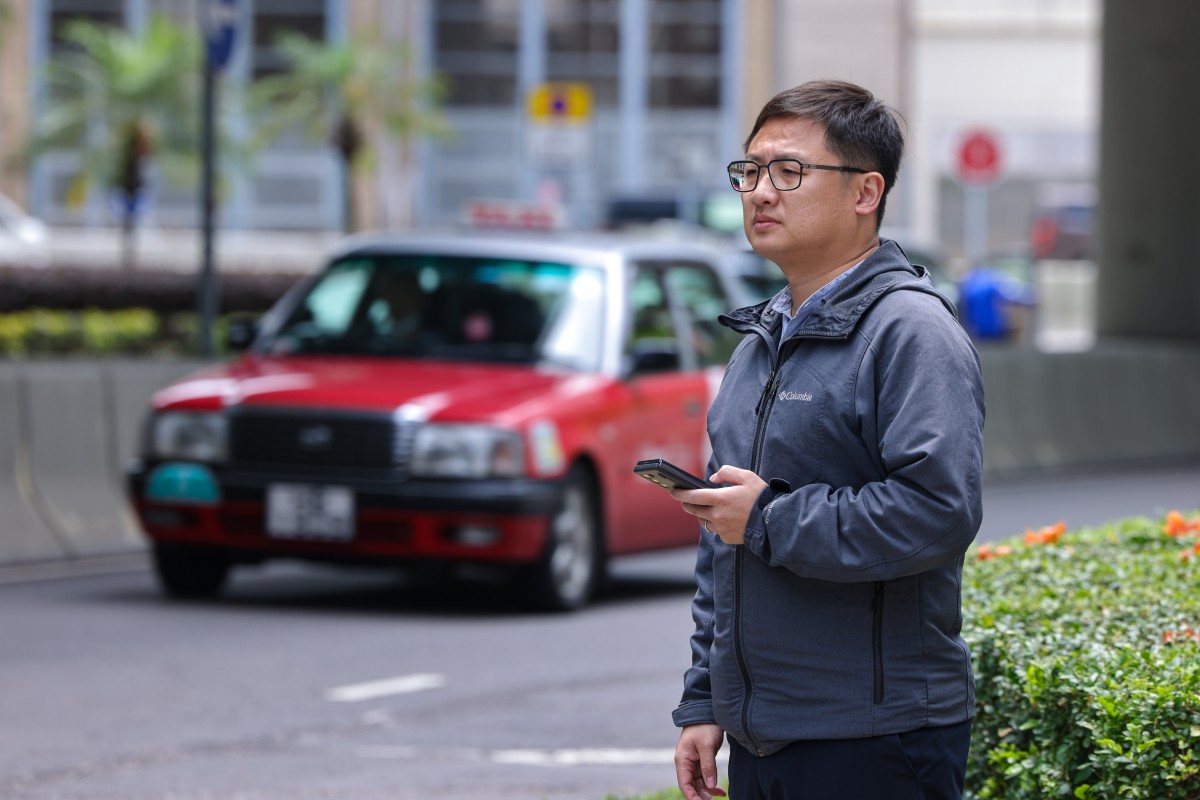
Secretary for Transport and Logistics Mable Chan says authorities will keep a close eye on premium fleets to ensure they improve by July
 Lawmaker Gary Zhang Xinyu, a member of the Legislative Council’s transport panel, trying – struggling – to book a ride with premium taxi fleet JOIE. Photo: Nora Tam
Lawmaker Gary Zhang Xinyu, a member of the Legislative Council’s transport panel, trying – struggling – to book a ride with premium taxi fleet JOIE. Photo: Nora TamBefore you read: Trial runs of Hong Kong’s new premium taxi fleets had significant challenges, including driver shortages and booking issues. The government is demanding significant improvements before giving these operators full licences.
Think about it: How might the premium taxi fleets change Hong Kong’s overall transport landscape? What are the potential long-term benefits and challenges for both drivers and passengers?
Hong Kong’s transport minister has warned premium taxi fleet operators that they must significantly improve their service quality or risk losing full licensing.
Secretary for Transport and Logistics Mable Chan gave the warning last week after one operator’s pilot scheme was met with cancelled orders and a shortage of drivers.
The spotlight fell on operators like JOIE, a subsidiary of major cab company Tai Wo Management, which had a turbulent start to its pilot scheme.
Passengers reported cancelled orders and significant delays despite booking rides an hour in advance. SynCab Service also launched its own trial run in January.
Dec 2024: Ride-hailing platform Tada launches in Hong Kong as city considers regulations
“I am aware that two taxi fleets recently conducted trial runs to fully gauge passenger experiences and get their feedback,” Chan said.
“The Transport Department will constantly monitor these fleets. And for those conducting trial runs, we will demand they further improve and better themselves according to passenger feedback to make sure they meet the requirements before receiving full fleet licences.”
This directive comes as the government pushes forward with its initiative to introduce higher-quality taxi services.
Five operators, including JOIE, SynCab, Big Boss Taxi Company, CMG Fleet Management, and Sino Development, are mandated to deploy approximately 3,500 licensed taxis by July.
The fate of their full licenses hinges on whether authorities deem them ready for service after these trial phases.
JOIE, which aims to operate 800 cabs, and SynCab, which plans to launch with 425 electric and Nissan taxis before expanding to 5,000 vehicles over five years, have both encountered significant challenges in attracting and retaining drivers.
Industry representatives point to inflexible working hours and a resistance to change among established drivers as primary obstacles.
“Working in a fleet might be more attractive to younger drivers. For the older ones, they might not enjoy being regulated or facing too many restrictions,” said Ho Chi-keung, who leads the Motor Transport Workers General Union’s taxi division.
He said there was a communication gap between operators and potential drivers: “I do not really see the premium fleet operators reaching out to hire drivers. They might be hiring, but drivers do not know how to apply.”
But he disagreed that the city should bring in labour from mainland China to solve the sector’s manpower crunch, which would take away employment opportunities from local taxi drivers: “Many foreign labourers are not familiar with Hong Kong’s roads,” Ho said.
April 2024: Hong Kong clamps down on taxi driver misbehaviour, overcharging
SynCab founder and executive director Sonia Cheng Man-yee acknowledged the recruitment challenges, revealing that her company had not met its target of recruiting enough drivers to operate about 100 cabs.
“Many drivers are adopting a wait-and-see attitude when it comes to joining premium fleets,” she said, attributing this reluctance to drivers’ unwillingness to alter their established routines.
“They might be more familiar with more instant ways to pick up passengers.”
To incentivise drivers, Cheng said her company offers up to 84 per cent more per trip, along with performance bonuses and a monthly salary of up to HK$10,000 (US$1,285).
Lawmaker Ben Chan Han-pan emphasised the transitional nature of the current phase, calling for greater government support for operators.
“There will be improvement with more competition. Companies will have to come up with the best offers to recruit drivers for their fleets. This will also increase the drivers’ income,” he said.